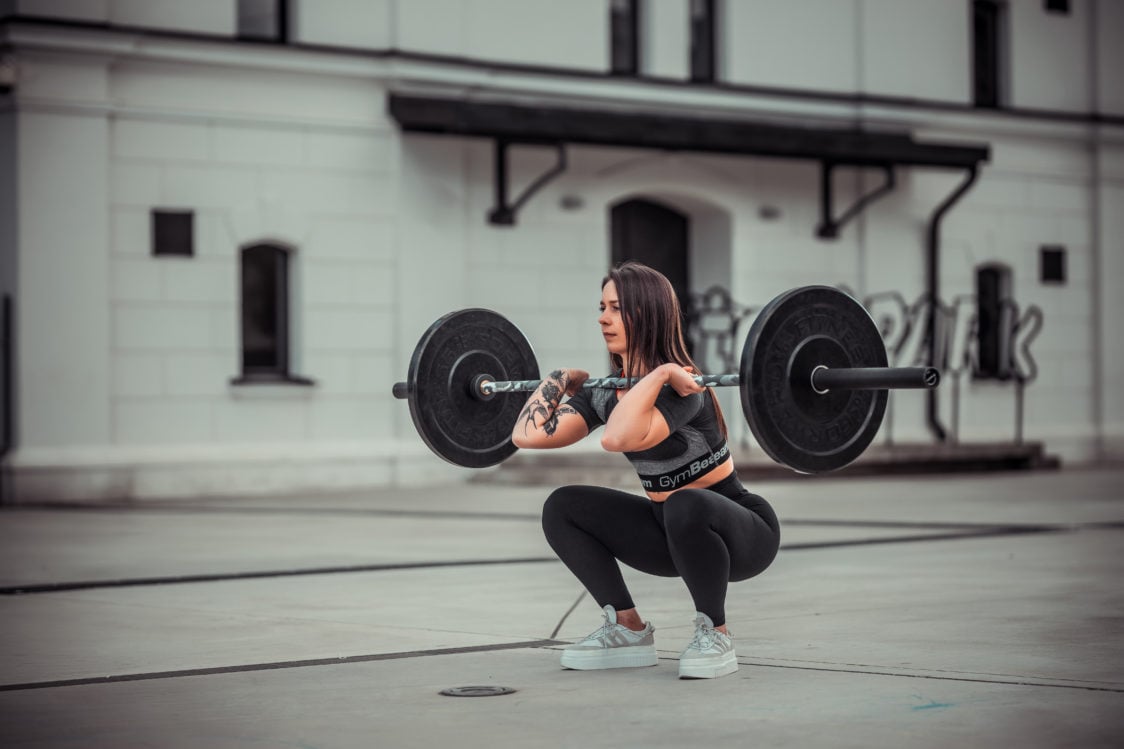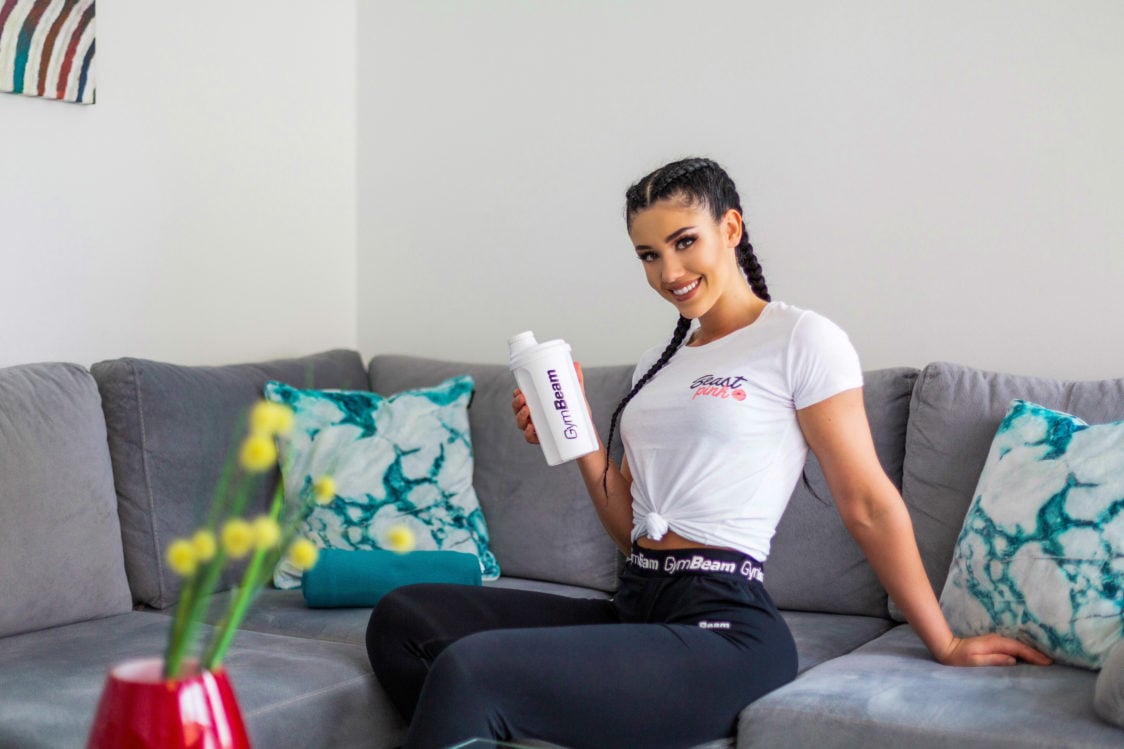Table of Contents
Protein has now rightly become a common staple in our diets. It probably doesn’t surprise anyone anymore when they meet someone at the gym or office who pours a mysterious powder into a shaker, mixes it with water and drinks it instead of a snack. There are even plenty of protein powders on the market that are designed specifically for women. But is it really appropriate for them to use it?
Since there are a lot of myths about protein, it is quite possible that people are a bit hesitant about consuming it. They’ve probably even heard an incredible story from someone about how someone drank protein and they became an extremely muscular bodybuilder, which is probably not what many women want.
Let’s take a look at what protein really is, what you can expect from it and whether women should include it regularly in their diet.
What is protein?
Speaking of protein, we should first explain what it actually is. I may disappoint someone right away, but it is not some magic powder with an out of this world effect. In simple terms, it is a concentrated source of protein that is made from commonly available foods rich in this macronutrient.
Typically, these foods may be:
- Milk, which is used to produce whey protein and micellar casein.
- Eggs, used to produce egg protein (egg albumin).
- Soybeans, used to produce vegan soy protein.
- Peas, used to make vegan pea protein.
By its very nature, you don’t have to worry about the protein being a steroid or banned substance. As long as you don’t routinely avoid these foods, there’s no reason to fear whey or any other protein. It can provide you with valuable protein, just like a serving of meat, dairy or legumes. The only difference is that protein is a cleaner source of this macronutrient. Thus, it contains more protein at the expense of fats and carbohydrates.
What can protein help women with?
Protein is most commonly associated with muscle growth. However, this is far from the only area it affects. Let’s take a closer look at it so you can get a complete picture of its benefits.
1. Reduces cravings and hunger
It’s no secret that protein is the macronutrient with the highest satiating effect. This is what all high-protein diets are based on. This ability of protein is also confirmed by the results of studies. According to them, a higher intake leads to the final result that one does not have as many cravings and hunger, which makes one eat less food and thus inadvertently reduces one’s caloric intake. The significantly higher difference in satiety after a protein-rich meal has also been confirmed by other studies. It compared the post-meal satiety levels of people who ate a meal with 10% protein to a group that ate a meal with 68% protein. [1] [25]
So if you have sweet cravings in the afternoon, which you chase away with chocolate, fruit, sweet coffee and other goodies, it can be much more effective to drink a protein shake. It will fill your stomach, satiate you, and also chase away any further cravings for a snack. [2-6]
Do you often have sweet cravings? Then Appetite Control and our other tips from our article How to Get Rid of Constant Hunger and Cravings could help you.

2. Accelerates the metabolism and promotes weight loss
Have you heard about protein and its ability to speed up the metabolism? It’s not just a myth. In fact, protein has the highest thermic effect of all macronutrients. Simply put, this means that the body itself uses more energy to metabolize them, and so a person burns calories for practically free. [7-9]
What about the thermal effect of macronutrients?
- Protein – the thermic effect is 20 – 30%, which means that out of 100 kcal you take in from protein, your body uses 20 – 30 kcal to burn it.
- Carbohydrates – the thermic effect is 5 – 10%, which means that out of 100 kcal you take in from carbohydrates, the body uses 5 – 10 kcal to process it.
- Fats – the thermal effect of fat is 0 – 3%, which is the lowest of all the macronutrients, so the body uses a maximum of 3 kcal per 100 kcal of fat intake to metabolize it.
The final energy intake is then reduced by the energy the body uses to metabolise the macronutrient. This virtually free and effortless calorie burning can also be known as metabolic acceleration. Thus, with a higher protein intake, you can easily reduce your intake and simplify your weight loss compared to a diet that would be low in protein. Thus, in the long run, the thermic effect of protein is another piece to the puzzle of successful weight loss. You can also support this with Yum Yum Whey protein, which is enriched with fat burners, and so will further support your efforts to shed a few kilos.
If you want to learn more about how metabolism works, you shouldn’t miss our article Can I Have a Slowed or Damaged Metabolism? 5 Tips to Speed Up Your Metabolism.
You might be interested in these products:
3. Supports your skin beauty
Probably everyone has already noticed the boom in the form of a plethora of protein (collagen) supplements. Although they are often attributed with unrealistic effects, it is undeniable that they can have an impact on the quality of your hair, nails and skin. Collagen is a protein that is found in important tissues of the body and can thus directly or indirectly affect their quality.
How can protein improve hair quality?
Hair is largely made up of a protein known as keratin. To produce it, the body needs various amino acids. And since proteins are made up of amino acids, protein can also help with their optimal intake. Thus, even a commonly available protein can be said to support the synthesis of keratin, which affects the quality and appearance of your hair. [10-11]
How can protein improve nail quality?
The quality of your nails is also related to optimal protein intake. Sufficient protein will support the production of keratin, which is also an important part of the nail structure. Protein can thus help improve their quality, strength and overall appearance. [12]
How can protein improve your complexion?
In the context of skin, again, we can’t leave out the importance of collagen. In order for the body to produce collagen, it needs procollagen, which is formed from glycine and proline. Thus, protein is usually the source of these important amino acids, so it can help you with collagen formation in the end. However, you can equally take collagen protein itself. Ideally, then, you should choose the hydrolysed form, which contains smaller and more absorbable parts for the body. If you have a sufficient supply of these key substances, you may notice positive effects on your skin as well. Specifically, it can look fresher, more hydrated, younger, more elastic and give an overall healthier appearance. [13–14]

4. Improves regeneration after workouts and injuries
When muscles are loaded during strength training, microtraumas are created in muscle structures that need to be repaired. It is the protein that helps with this recovery. Thanks to this, the repair of muscle fibres occurs, and muscles become larger and stronger. This regenerative ability of protein can also be used in the case of injury to support the regeneration of other tissues and return to normal life as soon as possible. This could be joints, tendons or bones, for example. As a matter of fact, protein is an important component of all cells in the body, not just muscles. [15-17]
Are you interested in the topic of regeneration? Then you should not miss our article How to Promote Regeneration with a Massage Gun and Other Fitness Accessories?
5. Assists with muscle maintenance and growth
Protein is a component of body’s cells and can rightly be considered the building block of the muscles. If you don’t get enough of it, your body may not have enough to ensure muscle growth, or at least muscle maintenance. Since it is energetically and evolutionarily easier for the body to maintain fat mass compared to muscle mass, it can easily start to shed muscle mass. And this is definitely not something an active person wants. [18-19]
Sufficient protein intake is thus all the more important during a calorie deficit. During this period, your intake is usually not as high and it can be even harder to obtain the optimal amount of protein that will be sufficient for your body. Protein is such a great way to get the necessary dose of this macronutrient into you quickly and easily.
If you’re looking for more tips on high-protein foods, you shouldn’t miss our article on Twenty Foods that Can Easily Add Protein to Your Diet.
6. Promotes bone health
Protein is an integral component of the cells of various tissues, including bone. So it’s no surprise that they are associated with maintaining their health. The results of some studies even show that protein could help to some extent to prevent the risk of developing osteoporosis and fractures. So protein is not just important for active people. Older people or post-menopausal women, who are at increased risk of developing osteoporosis, may also benefit from its impact on bone health. [20-23]

7. Boosts immunity and overall health
Protein is also important for your overall health. It is the basic building block for the formation of white blood cells, which makes them indispensable for your immunity. However, in addition to proteins, whey protein, for example, also supplements biologically active protein fractions, including immunoglobulins, alpha- and beta-lactoglobulin or lactoferrin. These are also beneficial for your immunity.
Vitamins and minerals, which are often contained in proteins powders for women, can also help support overall health. In the ingredients list of protein powder you can find, for example, vitamin A, C, D and selected B vitamins (B6, B9 and B12), which have an impact on the proper functioning of immunity. For example, the iron contained in the vitamins are also very important for women. This mineral may be deficient in the body of those of you who suffer from heavy menstrual periods. As a result of increased blood loss, iron levels may also be reduced, which is manifested, for example, by increased fatigue, pallor and so on.
- If you want to learn more about what role specific vitamins play in the body, you shouldn’t miss our article The Complete Guide to Vitamins: What They’re for, how to Know When You’re Deficient and How Much to Take.
- You can read more about the effect of minerals on your body in our article The Complete Guide To Minerals: Functions, Recommended Daily Intake, Deficiencies.
Proteins for women are often enriched with other specific substances to support the female body. For example, digestive enzymes that can improve digestion, bloated belly and also the digestibility of the protein. Moreover, fibre, which is a common ingredient in proteins for women, can also have a positive effect on digestion. This will also increase their ability to satiate for a longer period of time.
Want to learn more about why you have a bloated belly? Then you shouldn’t miss our article Stomach Bloating and How to Get Rid of It?
What myths are spread not only in connection with proteins for women?
In addition to the correct information that circulates about proteins, you can often encounter myths. These unfortunately spoil their good reputation. Let’s break down the most common ones and explain why they may not be entirely true.
1. If you take protein, you will become over-muscular bodybuilder
Since protein is not an anabolic steroid, nor does it contain any substances that can produce such rapid muscle growth, it is impossible to become unnaturally muscular women because of protein. Having a scoop of protein is basically the same as eating cottage cheese or a slice of chicken. On the other hand, if gaining muscle was that easy, do you think gyms would be full of girls who regularly work out and do heavy squats to get that butt muscles? I don’t think so.
The role of protein lies in its ability to repair damaged muscle fibres after training, thus helping them to strengthen and grow. However, given the genetic and hormonal makeup that women have, you don’t have to worry about overly muscular muscles. Every gram of muscle mass, unfortunately, will have to be laboriously earned through sports and strength training.

2. Protein should only be used by a person who lifts weights
Protein is definitely not just a supplement for strength athletes. Since it is a concentrated source of protein, it is ideal for anyone who needs to increase its intake. For example, an active woman has to eat 130g of protein, it may not be quite so easy for her. Protein supplement can be a great help in this case. And it doesn’t matter if she takes it in the form of a protein powder with water or adds it to various dishes. With its help you can create a complex breakfast or lunch with a balanced protein ratio.
Strength and power athletes have a greater need for protein due to their greater weight and activity compared to the inactive part of the population. However, this certainly doesn’t mean that other women and men should be afraid of taking it.
3. Protein makes you gain weight
It’s never just one food that’s to blame for getting fat, so there’s no point in blaming protein. Weight gain is usually caused by excessive energy intake combined with lack of exercise. This makes it easy to get into a caloric surplus that causes your weight to increase.
Protein, on the other hand, can be a great partner for anyone who would like to lose some weight. It can help reduce hunger and sweet cravings by helping to increase satiety. As a result, you eat fewer calories and it’s easier to fall into an energy deficit. Protein can also help increase your output with its thermic effect, which again goes hand in hand with faster weight loss. So if you’re using protein and feel like you’re getting fat, look elsewhere for the culprit.
If you want to choose the ideal protein for weight loss, you should not miss our article How to Choose the Best Protein for Weight Loss?
4. Whey protein makes you fat, it’s better to use vegan protein
Another claim again revolves around weight gain. This time, however, it’s not all proteins that are to blame, just whey protein. Whatever the origin of this myth, it is far from the truth. I refer again to the previous point that it is not one food that is to blame for getting fat, but overall lifestyle. However, if we were to go into detail and really address every calorie, it is likely that you would take in more energy from plant protein for the same amount of protein. This is because these are generally less easily absorbed, and one serving often has less protein.
- If you need to take in 23g of protein, one 30g serving of True Whey in caramel flavour, which has 113 kcal, will be sufficient.
- In case you would like to take in 23g of protein from just the caramel flavoured sunflower protein, you would need to use approximately 58g of this protein and take in about 212kcal, which is almost twice as much compared to whey protein.
As you can see, a scoop of whey protein is not a calorie bomb, so you definitely don’t have to worry about gaining weight. On the contrary, you may easily find that you need to take in more vegetable protein to meet your protein requirements, thereby increasing your overall energy intake.

When choosing a plant-based protein, it is therefore important to pay attention to the high proportion of protein and the amount of other macronutrients it contains. For example, soy proteins or blends that contain a combination of legume and cereal proteins can be a great choice, resulting in a more favourable amino acid spectrum.
If you want to learn more about choosing not only vegetable proteins, you should not miss our article How to Choose the Right Protein for Weight Loss or Muscle Growth?
5. Protein is harmful to the kidneys and liver
This myth concerns the alleged negative effect of protein on kidney health. However, this claim has also been refuted. This was carried out by a team of experts headed by Dr Antonio, who had their sports respondents consume a relatively high amount of 2.5 – 3.3g of protein per kilogram of body weight every day for a year. After a year, it was found that even this increased protein intake did not have a negative effect on these organs or cause undesirable changes to blood lipids. [24]
Since it is generally recommended to consume approximately 1.2 – 2 grams of protein per kilogram of body weight every day, you don’t have to worry about the negative effects of excessive protein intake.
How much protein should women consume?
There is no one value that is optimal for protein intake for all women. In fact, it depends on body composition, age, physical activity and other factors. If two women of the same age, weight and lifestyle were standing next to each other, their protein requirements could differ by tens of grams. So don’t compare yourself to others and just focus on yourself and your body.
- The universal rule of thumb for protein intake is: Each person should consume about 1.2 – 2g of protein per kilogram of body weight (BW) each day, depending on their physical activity. However, those who do not do sports at all can get by with 0.8g of protein per kilogram of body weight.
Woman’s weight | Protein intake for women who do not exercise (0.8g per kg of BW) | Range of protein intake depending on activity level (1.2 – 2g per kg of BW) |
|---|---|---|
| 55kg | 44g | 66 – 110g |
| 60kg | 48g | 72 – 120g |
| 65kg | 52g | 78 – 130g |
| 70kg | 56g | 84 – 140g |
| 75kg | 60g | 90 – 150g |
| 80kg | 64g | 96 – 160g |
Why does protein intake vary between women and how to understand it?
In order to make the issue of protein intake easier to understand, we will explain it using the example of a woman named Jane who weighs 60 kg.
- If Jane did not exercise and spent most of her day sitting at work or lying on the couch at home, she would have a protein intake of 0.8g of protein per kg of BW. Therefore, she would need to eat 48g of protein daily.
- If Jane went out 3 times a week to do sport (cycling, skating or running) and lived a more active life in general, her protein needs would be slightly higher. It would probably be somewhere around 1.2g of protein per kg of BW. This would mean she needs to eat approximately 72g of protein every day.
- If Jane had a more active lifestyle and did strength training 3 times a week, her protein requirement could be around 1.6g per kg of BW. This would mean that she needs to eat up to 96g of protein per day.
- If Jane was on a strict regime, dieting and exercising several times a week, her protein requirement could be between 2 – 2.4g of protein per kg of BW. This would mean that she needs to eat 120 – 144g of protein every day. [26]
Also keep in mind that it’s not ideal to rely on protein alone. A balanced diet consisting of multiple sources of protein should be the basis.
Which foods are rich in protein?
- chicken, pork and beef
- fish and seafood
- plant-based meat alternatives
- legumes
- eggs
- dairy products
- cereals
- nuts
If you want to calculate approximately how much protein, carbohydrates and fats your body needs in relation to activity and other aspects, you shouldn’t miss our macronutrient calculator.

How to use protein?
Protein is perhaps one of the most versatile substances and its possibilities of use are truly varied.
- The easiest way to consume it is to mix it with water. This creates an ideal post-workout drink that will help repair damaged muscles almost immediately.
- However, you can also mix it with plant-based or animal milk and enjoy it as a delicious creamy drink.
- You can use it to make a delicious protein coffee drink (Dalgona coffee) that is guaranteed to refresh you on hot summer days.
- It can be added into smoothies to create a nutritious snack that satisfies you for longer.
- You can use it to make delicious protein puddings or porridge.
- However, the protein can be used just as well in the preparation of desserts. How about making a delicious cherry pie, chocolate candies, coconut cake or chocolate lava cake?
- What’s more, protein doesn’t just belong in sweet treats. If you choose an unflavoured option, you can use it to make a delicious protein pizza dough.
When to use protein?
- to add quality protein to regular meals
- when preparing sweet desserts in which you want to increase the protein content
- on its own as a post-workout drink to aid recovery
- as a snack in case you get hungry and don’t have time to prepare a meal
- whenever you need to up your protein intake
What should you remember?
You don’t have to be an active athlete to make protein a regular part of your diet. Since it’s a concentrated source of protein, it can help you feel fuller after meals, fight off sweet cravings, and even speed up your metabolism. So it’s not only a great helper in gaining muscle, but also to ensure a calorie deficit. If you come across myths that protein is not suitable for women because it makes you fat, causes extreme muscle growth or has a negative effect on your health, don’t believe them. Feel free to enjoy your favouring protein shake or add it to your favourite dishes.
Do you have girlfriends in your circle who don’t use protein yet? Share our article with them. Maybe they’ll like it too.
[1] R Crovetti et al. – The influence of thermic effect of food on satiety – https://www.nature.com/articles/1600578
[2] Thomas L Halton et al. – The effects of high protein diets on thermogenesis, satiety and weight loss: a critical review – https://pubmed.ncbi.nlm.nih.gov/15466943/
[3] Pesta et al. – A high-protein diet for reducing body fat: Mechanisms and possible caveats. – https://doi.org/10.1186/1743-7075-11-53
[4] Halton et al. – The effects of high protein diets on thermogenesis, satiety and weight loss: A critical review – https://www.ncbi.nlm.nih.gov/books/NBK70804/
[5] Wendy AM Blom et al. – Effect of a high-protein breakfast on the postprandial ghrelin response – https://academic.oup.com/ajcn/article/83/2/211/4649849?login=true
[6] Manuela P G M Lejeune et al. – Ghrelin and glucagon-like peptide 1 concentrations, 24 h satiety, and energy and substrate metabolism during a high-protein diet and measured in a respiration chamber – https://pubmed.ncbi.nlm.nih.gov/16400055/
[7] Thermic Effect of Food – https://examine.com/topics/thermic-effect-of-food/
[8] James Hill, Wyatt, H. R., & Peters, J. C. – The Importance of Energy Balance – https://doi.org/10.17925/EE.2013.09.02.111
[9] G W Reed, J O Hill – Measuring the thermic effect of food – https://pubmed.ncbi.nlm.nih.gov/8561055/
[10] Fei-Chi Yang et al. – The structure of people’s hair – https://www.ncbi.nlm.nih.gov/pmc/articles/PMC4201279/
[11] Guoyao Wu – Amino acids: metabolism, functions, and nutrition – https://pubmed.ncbi.nlm.nih.gov/19301095/
[12] Roland Moll et al. – The human keratins: biology and pathology – https://www.ncbi.nlm.nih.gov/pmc/articles/PMC2386534/
[13] Sam Shuster – Osteoporosis, like skin ageing, is caused by collagen loss which is reversible – https://www.ncbi.nlm.nih.gov/pmc/articles/PMC7160787/
[14] Marlyn Wu et al. – Biochemistry, Collagen Synthesis – https://www.ncbi.nlm.nih.gov/books/NBK507709/
[15] L Russell et al. – The importance of patients' nutritional status in wound healing – https://pubmed.ncbi.nlm.nih.gov/12070399/
[16] David Frankenfield – Energy expenditure and protein requirements after traumatic injury – https://pubmed.ncbi.nlm.nih.gov/16998142/
[17] James G. Tidball – Mechanisms of Muscle Injury, Repair, and Regeneration – https://www.researchgate.net/profile/James-Tidball-2/publication/237017826_Mechanisms_of_Muscle_Injury_Repair_and_Regeneration/links/5a555752aca272bb696235e5/Mechanisms-of-Muscle-Injury-Repair-and-Regeneration.pdf
[18] John D Bosse et al. – Dietary protein to maximize resistance training: a review and examination of protein spread and change theories – https://pubmed.ncbi.nlm.nih.gov/22958314/
[19] Eric R Helms et al. – A systematic review of dietary protein during caloric restriction in resistance trained lean athletes: a case for higher intakes – https://pubmed.ncbi.nlm.nih.gov/24092765/
[20] Jean-Philippe Bonjour – Dietary protein: an essential nutrient for bone health – https://pubmed.ncbi.nlm.nih.gov/16373952/
[21] Marian T. Hannan et al. – Effect of Dietary Protein on Bone Loss in Elderly Men and Women: The Framingham Osteoporosis Study – https://asbmr.onlinelibrary.wiley.com/doi/full/10.1359/jbmr.2000.15.12.2504
[22] Jean-Philippe Bonjour – Dietary protein: an essential nutrient for bone health – https://pubmed.ncbi.nlm.nih.gov/16373952/
[23] Commission Regulation (EU) No 432/2012 of 16 May 2012 establishing a list of permitted health claims made on foods, other than those referring to the reduction of disease risk and to children’s development and health – http://data.europa.eu/eli/reg/2012/432/oj
[24] Jose Antonio et al. – A High Protein Diet Has No Harmful Effects: A One-Year Crossover Study in Resistance-Trained Males – https://www.hindawi.com/journals/jnme/2016/9104792/
[25] Margriet S. Westerterp-Plantenga et al. – Dietary protein – its role in satiety, energetics, weight loss and health – https://www.cambridge.org/core/journals/british-journal-of-nutrition/article/dietary-protein-its-role-in-satiety-energetics-weight-loss-and-health/CCA49F7254E34FF25FD08A78A05DECD7
[26] Thomas M Longland et al. – Higher compared with lower dietary protein during an energy deficit combined with intense exercise promotes greater lean mass gain and fat mass loss: a randomized trial – https://pubmed.ncbi.nlm.nih.gov/26817506/


Add a comment